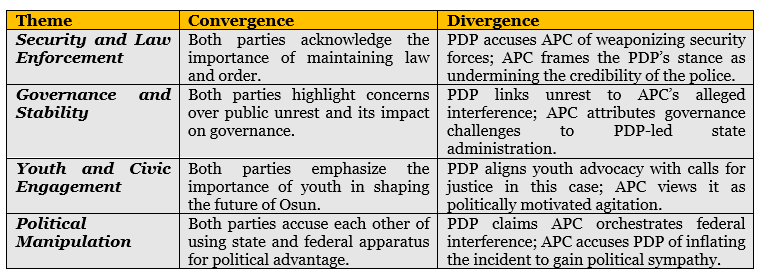
The political climate in Osun State is heating up ahead of the 2026 governorship elections. At the center of the storm lies the controversial arrest and shooting of Nurudeen Alowonle, Chairman of the Osun State Transport Management System (OSTMS). What began as a law enforcement operation has morphed into a political flashpoint, with accusations of extrajudicial actions, political manipulation, and deteriorating governance dominating the discourse.
This incident encapsulates key issues that will likely shape the 2026 elections, including security, governance, trust in institutions, and the increasing role of youth advocacy. Our analyst notes that through the divergent narratives of the two major political parties, the Peoples Democratic Party (PDP) and the All Progressives Congress (APC), the contours of the political battlefield in Osun come into sharper focus.
Themes of Convergence and Divergence in Political Narratives
The exhibit below highlights areas of agreement (convergence) and conflict (divergence) between the PDP and APC on the key issues surrounding the Alowonle incident.
Register for Tekedia Mini-MBA edition 19 (Feb 9 – May 2, 2026): big discounts for early bird.
Tekedia AI in Business Masterclass opens registrations.
Join Tekedia Capital Syndicate and co-invest in great global startups.
Register for Tekedia AI Lab: From Technical Design to Deployment (next edition begins Jan 24 2026).
Exhibit 1: political parties’ narratives over the incident

Law and Order: A Security Crisis in Focus
The PDP has framed the Alowonle incident as a failure of law enforcement and a politically motivated attack. Their narrative emphasizes the excessive force allegedly used by the police, branding it an “assassination attempt” linked to APC’s national ambitions to reclaim the Southwest. The party’s statements resonate with public concerns over police brutality and extrajudicial killings, a recurring theme in Nigeria’s socio-political discourse.
The APC, on the other hand, has largely stayed silent on the matter, likely to avoid drawing further attention to the incident. However, this silence risks being interpreted as complicity, giving the PDP room to dominate the narrative. For the electorate, the incident underscores broader questions about the neutrality and professionalism of law enforcement agencies, a key issue likely to influence the 2026 elections.
Governance and Trust in Institutions
Public reactions, such as those from IleriOluwa Online Media, a group loyal to the former governor Gboyega Oyetola, stress a growing sentiment that Osun has shifted from being a peaceful state to a hotbed of unrest. The disruptions caused by roadblocks and protests illustrate the direct impact of political tensions on governance and daily life.
The PDP has seized this opportunity to criticize the APC for contributing to the destabilization of Osun, drawing a connection between the unrest and national APC leadership. The party’s argument centers on a perceived federal overreach, with PDP officials alleging that the APC uses security forces as tools for political suppression.
Conversely, the APC may frame the unrest as evidence of governance failures under the PDP-led state administration, potentially arguing that the current government has not effectively managed security and public order. This divergence in narratives sets the stage for governance and institutional trust to become central campaign issues.
Youth Advocacy and Political Mobilization
The role of Osun’s youth in demanding justice for Alowonle reflects a broader trend of political consciousness among younger demographics. Youth groups have called on the Inspector General of Police to ensure justice, positioning themselves as watchdogs of institutional accountability.
The PDP has embraced this activism, aligning itself with youth demands and framing the incident as part of a larger struggle for fairness and democracy. This alignment allows the party to tap into the energy and frustration of younger voters, a significant demographic in the state. The APC, however, may interpret youth involvement as politically charged, questioning the neutrality of these movements. While acknowledging the importance of youth engagement, the party might argue that the current activism is being leveraged to undermine its political standing.
Political Manipulation and Polarization
The Alowonle case has deepened polarization in Osun’s political landscape, with both the PDP and APC accusing each other of exploiting the incident for political gain. The PDP alleges that the APC, emboldened by recent national leadership changes, is escalating political violence to destabilize the state. The APC, in turn, might argue that the PDP is inflating the incident to distract from governance challenges and gain public sympathy. This mutual blame underscores the zero-sum nature of Osun’s political competition, where even non-political events are weaponized to score electoral points.
Hindsight
The Alowonle incident serves as a pivotal lens through which broader tensions shaping Osun’s political landscape can be understood. As parties prepare for the 2026 elections, their success will depend on their ability to navigate these challenges while addressing voters’ concerns effectively. For the PDP, aligning with youth advocacy and highlighting governance issues offers a strategic opportunity to strengthen its base. Conversely, the APC must focus on countering these narratives by emphasizing pragmatic governance and stability. In this era of heightened political awareness, the electorate’s decision will ultimately rest on which party presents the most credible and compelling vision for Osun’s future.
What Lies Ahead for 2026
The 2026 Osun governorship election will not merely be a contest of promises but a referendum on leadership, security, and governance. The PDP is likely to position itself as a defender of justice and stability, leveraging incidents like the Alowonle case to critique APC interference. Meanwhile, the APC will aim to challenge the PDP’s governance record, framing the unrest as evidence of the state government’s inadequacies.
For voters, issues such as law and order, trust in institutions, and youth empowerment will take center stage. The incident has also exposed a growing demand for accountability, with the electorate likely to favour candidates who offer clear solutions to Osun’s challenges rather than engaging in blame games.



